Features
Election funds: Need for transparency

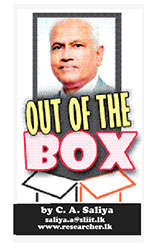 The transparency of election funds collected by political parties is a critical aspect of democratic governance, ensuring that electoral processes are fair, free from corruption, and reflect the true will of the people. Today I am trying to explore the significance of transparency in political financing, examining examples from around the world to highlight diverse approaches and their impacts on democracy.
The transparency of election funds collected by political parties is a critical aspect of democratic governance, ensuring that electoral processes are fair, free from corruption, and reflect the true will of the people. Today I am trying to explore the significance of transparency in political financing, examining examples from around the world to highlight diverse approaches and their impacts on democracy.
Regarding the situation in Sri Lanka, Transparency International reported several issues: the use of election campaigns to launder illegal funds, the purchase of allegiance from certain candidates or parties, the abuse of state resources, media patronage, and favoritism by political party leaders towards wealthier candidates. These practices result in a loss of focus on policy priorities and create an unequal playing field. Consequently, new entrants to politics, the poor, and the underrepresented are invariably the victims of these problems.
Many political parties and leaders visit countries with significant Sri Lankan communities, where it is well known that expatriates make substantial donations to fund their preferred political parties or leaders. However, these parties and leaders never disclose how much they collect or receive and how much they spend. Currently, Anura Kumara Dissanayake is at the forefront. Though they claim that they are a clean party, they have never disclosed the amount they’ve collected, the identities of major donors, or the campaign expenditures.
The Importance of Transparency in Election Funding
Transparency in election funding involves the disclosure of sources and amounts of donations received by political parties and candidates, as well as how these funds are spent. This transparency is vital for several reasons:
Preventing Corruption: Transparency deters corrupt practices by exposing illicit contributions and undue influence from powerful donors.
Enhancing Accountability: It holds political parties and candidates accountable to their constituents, ensuring they serve the public interest rather than private interests.
Promoting Public Trust: Open disclosure of campaign finances fosters trust in the electoral process and in democratic institutions.
Ensuring Level Playing Field: It helps to prevent disparities in political competition caused by unequal financial resources.
Global Approaches to Transparency in Election Funding
Countries around the world have adopted various measures to ensure transparency in election financing, with differing levels of success and challenges.
The common features
The United States, Germany, United Kingdom, Australia and New Zealand have a complex and relatively stringent systems of campaign finance regulations, primarily enforced by several authorities (for example, in USA the Federal Election Commission (FEC). Key aspects include:
Disclosure Requirements: Candidates, parties, and political action committees (PACs) must regularly disclose their financial activities, including contributions and expenditures.
Contribution Limits: There are limits on the amounts individuals and organizations can contribute to campaigns.
Super PACs: While Super PACs can raise and spend unlimited amounts, they are required to report their donors, although loopholes often allow for anonymous donations through intermediary organizations.
Public Funding: Political parties receive substantial public funding, reducing their reliance on private donations and minimizing potential for undue influence.
Electoral Bonds (India): Introduced as a reform measure, these bonds allow donors to contribute anonymously through the banking system, with the intention of reducing cash donations and increasing transparency. However, critics argue that the anonymity undermines transparency.
Despite these measures, challenges remain, particularly concerning “dark money” from non-profit organizations that are not required to disclose their donors. This has led to calls for stricter regulations to enhance transparency. Table 1 shows an example for election funding and spending in New Zealand.
Challenges and Recommendations
Despite various measures, challenges to transparency in election funding persist globally. Common issues include the influence of “dark money,” enforcement gaps, and the complexity of financial flows in politics. To address these, several recommendations can be made:
Strengthening Enforcement: Robust enforcement mechanisms are essential to ensure compliance with transparency regulations.
Closing Loopholes: Laws should be updated to close loopholes that allow anonymous donations and undisclosed financial flows.
Enhancing Public Funding: Increasing public funding for political parties can reduce dependence on private donations and promote fairness.
International Cooperation: Countries can benefit from sharing best practices and cooperating on transnational transparency issues.
Sri Lanka has historically faced significant issues with the transparency of political financing. Key concerns include the lack of comprehensive legal frameworks, limited disclosure requirements, and the pervasive influence of illicit funds in electoral campaigns.
Legal Framework: Sri Lanka’s legal framework governing political finance has been relatively weak. Unlike many established democracies, Sri Lanka has lacked robust laws mandating the disclosure of political donations or expenditures. This gap has allowed substantial unregulated financial flows into the political arena.
Disclosure Requirements: Despite the requirement for political parties and candidates to disclose their funding sources and campaign expenditures, the lack of compliance enforcement has enabled the infiltration of money in politics, frequently from questionable origins.
Influence of Illicit Funds: The opaque nature of political financing in Sri Lanka has created opportunities for corruption and the influence of money from illicit activities, including organized crime and questionable business practices.
Recognizing the detrimental impact of opaque political financing on democratic processes, Sri Lanka has undertaken several reforms aimed at enhancing transparency and accountability.
Challenges and Obstacles
Despite these efforts, several challenges and obstacles remain in achieving full transparency in political financing in Sri Lanka.
Legislative Hurdles: Enacting comprehensive campaign finance laws has proven difficult due to political resistance and competing interests within the legislative body. Politicians who benefit from the current system often oppose reforms that would limit their financial advantages.
Enforcement and Compliance: Even with new laws in place, effective enforcement is a significant challenge. The ECSL and other relevant bodies require adequate resources, authority, and political independence to enforce compliance effectively.
Public Awareness and Participation: Ensuring public awareness and participation in the process of monitoring political finance is crucial. Without active engagement from the electorate and civil society, reforms may not achieve their intended impact.
Comparative Perspective and Recommendations
To draw broader lessons from Sri Lanka’s experience, it is useful to compare with other countries that have successfully enhanced transparency in political financing.
Adopting Robust Legal Frameworks: Countries like Germany and the UK have established stringent legal requirements for political finance disclosure. Sri Lanka can benefit from adopting similar frameworks that mandate detailed and timely reporting of political donations and expenditures.
Empowering Independent Bodies: Effective oversight bodies, such as the Electoral Commission in the UK, play a critical role in ensuring compliance. Strengthening the ECSL’s powers and independence can enhance its ability to monitor and enforce campaign finance laws.
Public Funding and Spending Limits: Introducing public funding for political parties, as seen in Germany, can reduce reliance on private donations and promote a more level playing field. Additionally, setting limits on campaign spending can curb excessive financial influence in elections.
Table 1: This table summarises each registered party’s election and broadcasting allocation expenses.
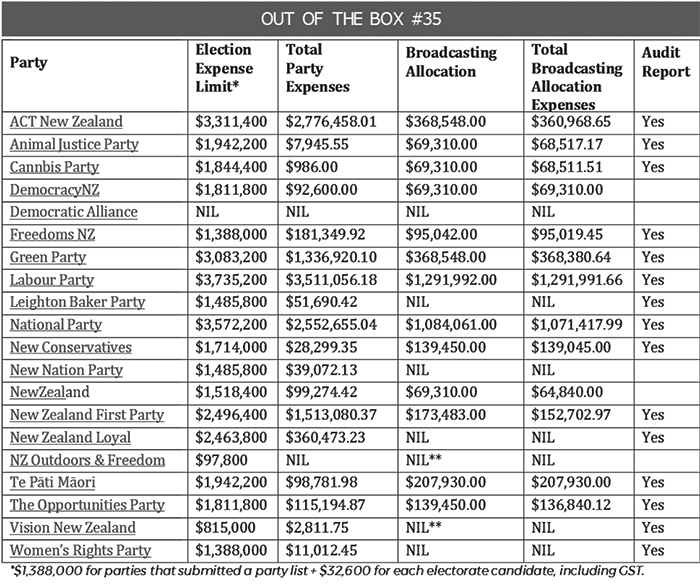
*$1,388,000 for parties that submitted a party list + $32,600 for each electorate candidate, including GST.
** A component party of Freedoms NZ which in accordance with section 79(3) of the Broadcasting Act 1989 is not entitled to a separate allocation.
Conclusion
Transparency in election funding is crucial for the health of democracies, ensuring that electoral processes are fair and free from undue influence. While different countries adopt varying approaches, common principles such as rigorous disclosure requirements, effective regulatory oversight, and public funding can significantly enhance transparency. By learning from global examples and addressing ongoing challenges, nations can strengthen their democratic institutions and foster greater public trust in their political systems.
The transparency of election funds in Sri Lanka is a complex issue with significant implications for the country’s democratic processes. While recent reforms and efforts mark a positive step towards greater transparency, substantial challenges remain in compliance. By learning from international best practices and continuing to advocate for robust legal and institutional reforms, Sri Lanka can enhance the transparency and integrity of its electoral system. This, in turn, will strengthen its democratic governance and build greater public trust in its political institutions.
(The writer, a senior Chartered Accountant and professional banker, is Professor at SLIIT University, Malabe. He is also the author of the “Doing Social Research and Publishing Results”, a Springer publication (Singapore), and “Samaja Gaveshakaya (in Sinhala). The views and opinions expressed in this article are solely those of the author and do not necessarily reflect the official policy or position of the institution he works for. He can be contacted at saliya.a@slit.lk and www.researcher.com)
Features
Ukraine crisis continuing to highlight worsening ‘Global Disorder’
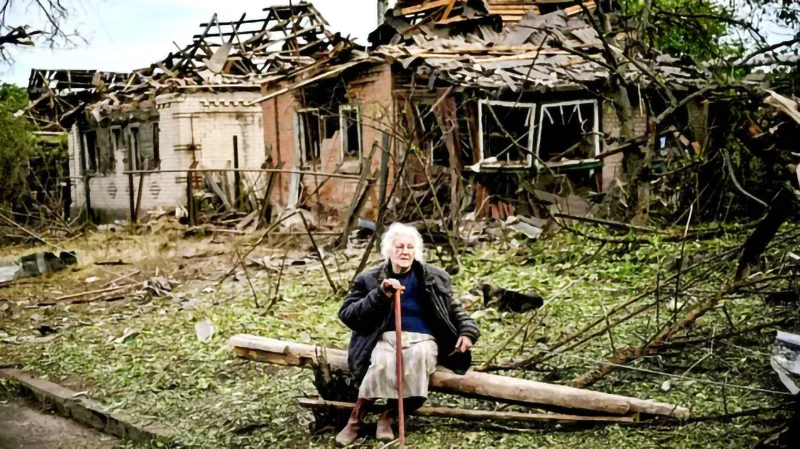
 The world has unhappily arrived at the 4th anniversary of the Russian invasion of Ukraine and as could be seen a resolution to the long-bleeding war is nowhere in sight. In fact the crisis has taken a turn for the worse with the Russian political leadership refusing to see the uselessness of its suicidal invasion and the principal power groupings of the West even more tenaciously standing opposed to the invasion.
The world has unhappily arrived at the 4th anniversary of the Russian invasion of Ukraine and as could be seen a resolution to the long-bleeding war is nowhere in sight. In fact the crisis has taken a turn for the worse with the Russian political leadership refusing to see the uselessness of its suicidal invasion and the principal power groupings of the West even more tenaciously standing opposed to the invasion.
One fatal consequence of the foregoing trends is relentlessly increasing ‘Global Disorder’ and the heightening possibility of a regional war of the kind that broke out in Europe in the late thirties at the height of Nazi dictator Adolph Hitler’s reckless territorial expansions. Needless to say, that regional war led to the Second World War. As a result, sections of world opinion could not be faulted for believing that another World War is very much at hand unless peace making comes to the fore.
Interestingly, the outbreak of the Second World War coincided with the collapsing of the League of Nations, which was seen as ineffective in the task of fostering and maintaining world law and order and peace. Needless to say, the ‘League’ was supplanted by the UN and the question on the lips of the informed is whether the fate of the ‘League’ would also befall the UN in view of its perceived inability to command any authority worldwide, particularly in the wake of the Ukraine blood-letting.
The latter poser ought to remind the world that its future is gravely at risk, provided there is a consensus among the powers that matter to end the Ukraine crisis by peaceful means. The question also ought to remind the world of the urgency of restoring to the UN system its authority and effectiveness. The spectre of another World War could not be completely warded off unless this challenge is faced and resolved by the world community consensually and peacefully.
It defies comprehension as to why the Russian political leadership insists on prolonging the invasion, particularly considering the prohibitive human costs it is incurring for Russia. There is no sign of Ukraine caving-in to Russian pressure on the battle field and allowing Russia to have its own way and one wonders whether Ukraine is going the way of Afghanistan for Russia. If so the invasion is an abject failure.
The Russian political leadership would do well to go for a negotiated settlement and thereby ensure peace for the Russian people, Ukraine and the rest of Europe. By drawing on the services of the UN for this purpose, Russian political leaders would be restoring to the UN its dignity and rightful position in the affairs of the world.
Russia, meanwhile, would also do well not to depend too much on the Trump administration to find a negotiated end to the crisis. This is in view of the proved unreliability of the Trump government and the noted tendency of President Trump to change his mind on questions of the first importance far too frequently. Against this backdrop the UN would prove the more reliable partner to work with.
While there is no sign of Russia backing down, there are clearly no indications that going forward Russia’s invasion would render its final aims easily attainable either. Both NATO and the EU, for example, are making it amply clear that they would be staunchly standing by Ukraine. That is, Ukraine would be consistently armed and provided for in every relevant respect by these Western formations. Given these organizations’ continuing power it is difficult to see Ukraine being abandoned in the foreseeable future.
Accordingly, the Ukraine war would continue to painfully grind on piling misery on the Ukraine and Russian people. There is clearly nothing in this war worth speaking of for the two peoples concerned and it will be an action of the profoundest humanity for the Russian political leadership to engage in peace talks with its adversaries.
It will be in order for all countries to back a peaceful solution to the Ukraine nightmare considering that a continued commitment to the UN Charter would be in their best interests. On the question of sovereignty alone Ukraine’s rights have been grossly violated by Russia and it is obligatory on the part of every state that cherishes its sovereignty to back Ukraine to the hilt.
Barring a few, most states of the West could be expected to be supportive of Ukraine but the global South presents some complexities which get in the way of it standing by the side of Ukraine without reservations. One factor is economic dependence on Russia and in these instances countries’ national interests could outweigh other considerations on the issue of deciding between Ukraine and Russia. Needless to say, there is no easy way out of such dilemmas.
However, democracies of the South would have no choice but to place principle above self interest and throw in their lot with Ukraine if they are not to escape the charge of duplicity, double talk and double think. The rest of the South, and we have numerous political identities among them, would do well to come together, consult closely and consider as to how they could collectively work towards a peaceful and fair solution in Ukraine.
More broadly, crises such as that in Ukraine, need to be seen by the international community as a challenge to its humanity, since the essential identity of the human being as a peacemaker is being put to the test in these prolonged and dehumanizing wars. Accordingly, what is at stake basically is humankind’s fundamental identity or the continuation of civilization. Put simply, the choice is between humanity and barbarity.
The ‘Swing States’ of the South, such as India, Indonesia, South Africa and to a lesser extent Brazil, are obliged to put their ‘ best foot forward’ in these undertakings of a potentially historic nature. While the humanistic character of their mission needs to be highlighted most, the economic and material costs of these wasting wars, which are felt far and wide, need to be constantly focused on as well.
It is a time to protect humanity and the essential principles of democracy. It is when confronted by the magnitude and scale of these tasks that the vital importance of the UN could come to be appreciated by human kind. This is primarily on account of the multi-dimensional operations of the UN. The latter would prove an ideal companion of the South if and when it plays the role of a true peace maker.
Features
JVP: From “Hammer and Sickle” to Social Democracy – Or not?
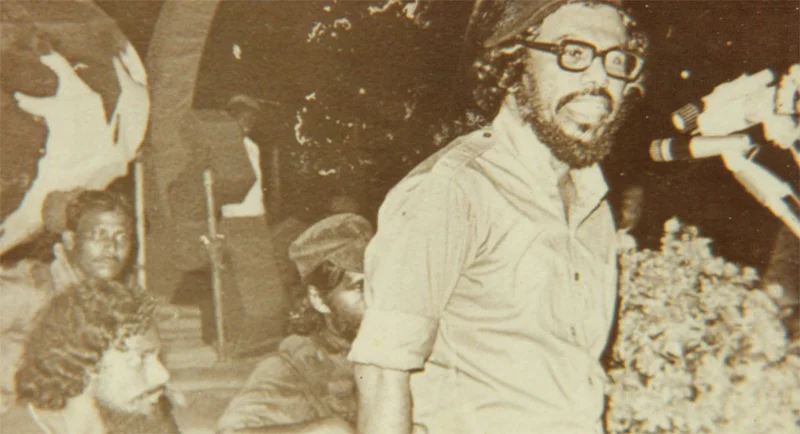
The National People’s Power (NPP), led by the Janatha Vimukthi Peramuna (JVP), came to power promising democratic renewal and long-awaited economic, educational, healthcare, and social transformation. It pledged to build a modern Sri Lanka rooted in democratic values while steering the country toward its vision of Democratic Socialism. For many supporters, the NPP’s rise to the pinnacle of political power represents a historic opportunity to reset the nation’s direction.
Yet recent developments have stirred unease. Statements by several senior ministers and certain policy signals have prompted critics to question whether the government’s path remains firmly democratic. Some warn that in the pursuit of rapid development and social justice, central pillars of the NPP’s election campaign, there may be a growing temptation to consolidate power in ways that edge toward policies of old “Hammer & Sickle.”
Is the NPP committed to pluralistic democratic socialism, or is Sri Lanka witnessing the early signs of a more centralised political model? To answer this question, it is necessary to revisit the JVP’s ideological history, examine the pressures that shape governing parties once in power, and weigh the potential consequences, both promising and perilous, of any shift in direction.
History of the JVP
The JVP emerged in the mid-1960s with a revolutionary agenda, mobilising youth through its Five Lecture Programme, which criticised capitalist policies, questioned the country’s “real independence,” opposed Indian influence, and called for armed struggle. This ideology culminated in the 1971-armed uprising against the elected government, leading to widespread violence, a harsh state crackdown, mass arrests, and the banning of the party.
Although suppressed, the JVP later re-entered democratic politics after its leaders were imprisoned and eventually pardoned. In the 1980s, after electoral defeat, the JVP shifted from strict Marxist-Leninist ideology toward a national, framework known as “Jathika Chinthanaya”, while maintaining strong opposition to Indian involvement.
However, it launched a second violent insurgency in 1988–1989, resulting in significant loss of life and severe repression, including the killing of its leader, Rohana Wijeweera. These events marked a decisive turning point, after which the party gradually moved away from armed struggle and embraced parliamentary politics.
By 1994, the JVP abandoned armed insurrection and embraced parliamentary democracy. While retaining its Marxist-Leninist identity, it adopted a more pragmatic socialist approach, seeking influence through elections rather than violence.
Embracing Parliamentary Democracy
The party served as Ministers and Deputy Ministers under President Chandrika Kumaratunga (2004–2005) and later supported Mahinda Rajapaksa in the 2005 presidential and subsequent parliamentary elections. Between 2005 and 2010, the JVP aligned with the Rajapaksa government in opposing federalism and supporting a unitary state.
Historically, the JVP opposed federalism. Under Anura Kumara Dissanayake (AKD), however, there appears to be a strategic shift toward decentralisation and inclusivity, without formally endorsing federalism. Since 2019, the NPP/JVP has criticised successive governments for failing to implement the 13th Amendment fully. This transformation is real and should be acknowledged.
Reports indicate the NPP/JVP is drafting a new constitution, but there is limited public clarity on its position regarding abolishing the Executive Presidency and devolving powers to Provincial Councils. Sri Lanka can chart a path toward a united, prosperous future where all citizens feel valued and represented. Therefore, I hope that NPP will consider the Provincial Councils in their current form might best serve as a relic of the past, making way for more cohesive and efficient systems of governance.
It is also a fact that many parties have historically criticised the Executive Presidency while in opposition, only to retain it in power. Whether the NPP/JVP will pursue genuine reform remains a subject of debate.
Democratic Concerns State Power
A recent statement by a senior Cabinet Minister that the party holds government power but has not yet “captured” broader state power raises fundamental questions. In a parliamentary democracy, winning government is the highest legitimate authority a party can obtain. Government power is temporary which is granted by voters, limited by the Constitution, and revocable at elections.
State power is permanent and it lies with state institutions i. e. the judiciary, administrative service, armed forces, law enforcement, and independent commissions. These bodies must remain politically neutral and serve the Constitution, to prevent any ruling party from dominating the permanent machinery of governance.
To frame democratic victory as incomplete without “capturing” state power, suggests a conception of power that goes beyond electoral legitimacy. It echoes a revolutionary mindset highlighting the real transformation requires ideological alignment of the state itself.
Past few decades, Sri Lanka has suffered from politicised institutions. Replacing one form of control with another is not reform, it is substitution.
Judiciary and Due Process
Public frustration over past corruption is understandable. However, allegations must be addressed through due legal process. In a democracy, individuals are innocent until proven guilty in a court of law. When parliamentarians publicly pass judgments on opposition figures before judicial proceedings conclude, it risks undermining the rule of law and raising concerns about political overreach.
Concerns are further heightened when there are perceptions that the rule of law is not applied equally, particularly if members of the governing party are treated differently in similar circumstances in the recent past. Unequal enforcement of legal standards can erode public trust in institutions. If such patterns persist, they may raise broader questions about the strength and impartiality of democratic governance.
Village-Level Courts
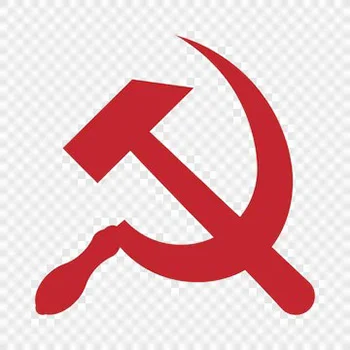
Democratic Concerns
State Power
In another recent statement, by a senior Minister reiterated one of his earlier proposals to establish judicial courts at the village level to adjudicate certain legal cases, depending on the nature and severity of the alleged offences. While improving local access to justice may enhance efficiency, such courts require strong institutional safeguards.
As this proposal raises serious concerns, it bears characteristics often associated with totalitarian systems, where village-level courts may be controlled by ruling party “cadres” who preside over legal matters and pass judgments against individuals. Without strong safeguards to ensure independence, transparency, and adherence to the rule of law, such courts could be misused to suppress dissent and curtail legitimate political opposition.
Any reform of the judicial system must uphold constitutional protections and preserve the separation of powers. Failing to do so could raise broader concerns about democratic accountability and institutional independence.
Civil / Administrative Service
Before 1978, Sri Lanka’s civil service was widely respected for its professionalism and independence. Over time, however, political appointments increasingly influenced senior administrative positions.
There are growing concerns that some recent appointments to high-level administrative service posts by the NPP may also be politically motivated. Many voters expected systemic reform and a decisive shift toward merit-based governance under the NPP/JVP. It is disappointing to observe indications that similar patterns of politicisation may be continuing.
The real test of reform lies not in rhetoric but in institutional safeguards. Transparent selection criteria, independent oversight mechanisms, and clear accountability structures are essential to ensuring that the administrative service remains professional and non-partisan.
History shows that democracy does not usually collapse overnight. It erodes gradually when ruling parties seek to align permanent institutions with their own ideological or political objectives.
Strengthening institutional independence is not optional, it is imperative. Sri Lanka’s democratic future depends not only on who holds power, but on how responsibly that power is exercised.
Media Freedom
“I disapprove of what you say, but I will defend to the death your right to say it”
(Evelyn Beatrice Hall, describing Voltaire’s belief in freedom of speech.)
Recent reports suggest the NPP/JVP government is dissatisfied with parts of the media, accusing some outlets of political bias and even proposing bans for allegedly spreading false information. Such actions would be undemocratic and would weaken constructive criticism.
Governments already possess legal remedies for defamation. If laws are inadequate, they may be reviewed. However, this must not undermine the media’s fundamental right to fair, independent, and legitimate criticism of those in power.
Every government dislikes criticism. But mature democracies tolerate it. Any attempt to restrict the media risks eroding democratic freedoms and should be adamantly opposed by all who value an independent media.
Religion and Public Conduct
In the past, opposition parties accused the JVP of being hostile to religion, particularly toward Buddhist monks aligned with political opponents. Confirming this accusation, recently a few NPP/JVP ministers, MPs, and party supporters have publicly criticised Buddhist monks who speak and organise meetings against the government.
At the same time, social media contains intolerable language about the conduct of certain Buddhist monks. While misconduct by members of the clergy is concerning, it does not justify hostile or disrespectful reactions from politicians or the public.
Responding with anger and division contradicts the very Dhamma many claim to defend. Using monks as political tools, or attacking them publicly, only deepens social divisions. If there are genuine concerns about the monastic order, they should be addressed respectfully through proper religious channels rather than through public humiliation.
Economic Democracy
Following Sri Lanka’s 2022 fiscal crisis, the NPP/JVP revised its economic policy and aligned itself with a framework closer to Social Democracy. This shift suggests that the JVP has accepted capitalism as the economic system necessary to revive the collapsed economy. At the same time, it has emphasised redistribution, welfare measures, and regulatory reforms aimed at reducing inequality.
The NPP/JVP’s economic policy now focuses on reforming capitalism rather than replacing it. The party initially sought to renegotiate the IMF agreement to ease the burden on the public. However, it was unable to secure significant changes. A key long-term objective remains reducing dependency on imports. The NPP aims to promote local industries and agriculture, while supporting small and medium-sized enterprises (SMEs) to reduce unemployment and expand export capacity.
Although the party pledged to strengthen state-owned enterprises through improved management rather than outright privatisation, recent developments indicate a shift toward public-private partnerships and selective privatisation.
Overall, economic progress is gradually aligning with these reformed Capitalist policies. This approach marks a significant departure from the original “Hammer and Sickle” ideology associated with classical Marxist theory as articulated by thinkers such as Karl Marx, Vladimir Lenin, and Friedrich Engels.
If judged solely on economic direction, the shift from revolutionary rhetoric to reformist governance appears substantial.
Bribery and Corruption
The nation is deeply grateful to the NPP government for taking bold steps to minimise bribery and corruption, which have long been a cancer eating away at our society. For decades, this practice has existed from top politicians to the lowest levels of the state sector, and even within society at large. Full credit must be given to the NPP government for prioritising the fight against this unethical and deeply rooted problem. It is hoped that the law will be applied equally to everyone, irrespective of status or party affiliation.
However, the public remains sceptical about the delay in pressing charges against the alleged culprits. During the election campaign, the JVP claimed that it possessed substantial evidence, over one hundred files, sufficient to prosecute members of previous governments accused of misusing public funds. Are they now discovering that the evidence is not as concrete as initially suggested?
Conclusion
Having analysed the current situation of the NPP/JVP, it is evident that there are conflicting statements from some senior figures in the JVP. Some favour the continuation of the traditional “Hammer and Sickle” policies. Others within the NPP emphasise and implement aspects of Social Democratic policies. Considering these differences, the nation is entitled to seek clarity regarding the government’s present direction.
It remains to be seen whether the JVP is merely marking time before reintroducing its former ideological policies, or whether it has genuinely chosen the path of Social Democracy.
By Gamini Jayaweera
Features
Valentine’s Day fundraiser … a huge success

In Melbourne, Australia, catering veteran Chris Cannon hosted the annual Valentine’s Day fundraiser at the Springvale RSL, with all proceeds being donated to the Home of Compassion in Sri Lanka, run by the Mother Teresa Sisters.
The Valentine’s Day fundraiser was held on 14 February and the event featured music by Shey and George (of Redemption fame) and DJ Jeremy Ekanayake.

Shey and George providing the entertainment
The international buffet was a spread of Thai specialties and yummy Sri Lankan dishes and the large crowd present enjoyed the setup thoroughly, I’m told.

The lucky winner … trip to Sri Lanka
The Thai Street Food buffet was provided by Chris Cannon’s catering service, with his Thai wife, Annie, doing the needful.

The Cannon Team: Alice, Annie and Chris
His daughter, Alice, also played an active part in this fundraiser.
Chris, a Sri Lankan-born Melbourne resident, who has been hosting this annual event for several years, with all proceeds going to charity, attributes the success of this Valentine’s Day fundraiser to the team that worked tirelessly to make it a happening event.

Rose and a teddy for the ladies
“I’m ever so grateful to the Team that was responsible for the success of this fundraiser. They all worked with enthusiasm and the smiles on their faces, at the end of the event, said it all.”
It was a sell-out, with every lady receiving a rose and a teddy but, unfortunately, said Chris “we had to disappoint several who wanted tickets as it was a limited space venue.”
What’s more, there were also attractive prizes on offer, including a seven nights stay in Sri Lanka.
-

 Features5 days ago
Features5 days agoWhy does the state threaten Its people with yet another anti-terror law?
-

 Features5 days ago
Features5 days agoReconciliation, Mood of the Nation and the NPP Government
-

 Features5 days ago
Features5 days agoVictor Melder turns 90: Railwayman and bibliophile extraordinary
-

 Features4 days ago
Features4 days agoLOVEABLE BUT LETHAL: When four-legged stars remind us of a silent killer
-

 Features5 days ago
Features5 days agoVictor, the Friend of the Foreign Press
-

 Latest News6 days ago
Latest News6 days agoNew Zealand meet familiar opponents Pakistan at spin-friendly Premadasa
-

 Latest News6 days ago
Latest News6 days agoTariffs ruling is major blow to Trump’s second-term agenda
-

 Latest News6 days ago
Latest News6 days agoECB push back at Pakistan ‘shadow-ban’ reports ahead of Hundred auction



















